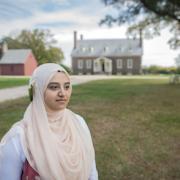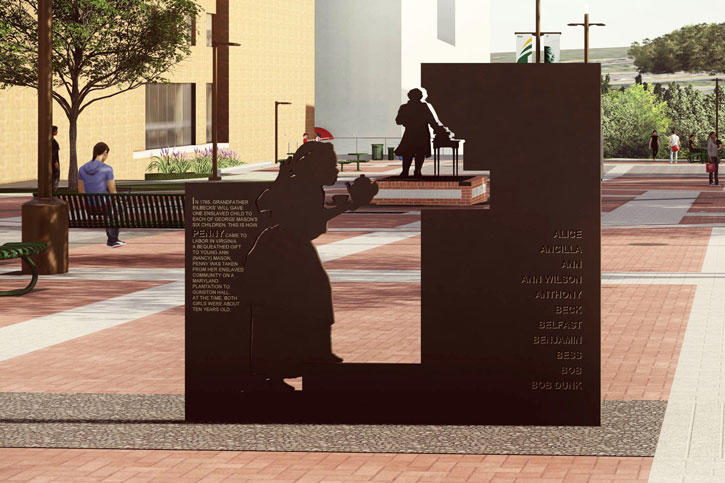Memorial to Honor Enslaved People
Looking ahead while honoring the past. Undergraduate research fuels inspiration for important memorial on Wilkin's Plaza. Credit: Perkins + Will
The Enslaved People of George Mason memorial, part of the Core Campus Project in Fairfax, and designed by Perkins + Will, will provide a more complete account of the complicated legacy of George Mason IV, a founding father who championed individual freedom but who also owned slaves.
The memorial, scheduled to be completed in 2021, will honor two of the more than 100 people enslaved at Gunston Hall—a 10-year-old girl named Penny and James, Mason’s manservant. The memorial on Wilkins Plaza will be designed to convey the hidden voices of the enslaved, the traditional voice of George Mason, and a space designed for students and others to reflect and share their own voices.
“It is important for our campus community to recognize that our university's namesake enslaved blacks and that his Declaration of Rights did not extend to those he enslaved—because we can only begin to move forward once we have accepted our past,” she said. “Through the ECGM project, we can start doing that at Mason. I applied [to] and then chose to join the project so that I could be a part of this important work.”
When searching through the George Mason University website for a summer job, Ayman Fatima came across a position that sparked her interest.
The Enslaved Children of George Mason project was looking for a research assistant. The project’s goal was to tell the previously untold stories of those who were enslaved by the university’s namesake, George Mason IV.
“This was something that I wished we had focused on more in class,” said the junior, who is double majoring in systems engineering and government and international politics. “… The fact that the men who designed American democracy owned other human beings, taking from them their liberty and creating an inherently unequal system.”
The project comes at a time when many universities are examining their histories with enslaved people.
"What we discovered, as faculty and students, is that we still have to wrestle with slavery as an institution even if we were not complicit as an institution in the system of slavery," said Wendi Manuel-Scott, a professor of history and art history at Mason and the former director of the African and African American Studies Program.


